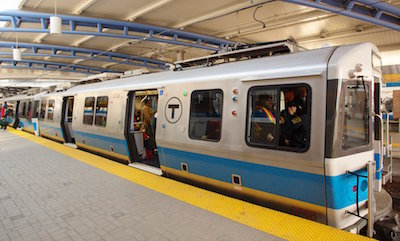Student Testifies on MBTA Fare Hike.
 On February 29, School of Public Health student Holli Childs argued against fare hikes proposed for the Massachusetts Bay Transportation Authority (MBTA), showing how higher fares would harm the health of populations in East Boston.
On February 29, School of Public Health student Holli Childs argued against fare hikes proposed for the Massachusetts Bay Transportation Authority (MBTA), showing how higher fares would harm the health of populations in East Boston.
“A population’s ability to access the T is a strong indicator of their health,” Childs told the MBTA Fiscal & Management Control Board during the public hearing, held at the State Transportation Building.
Other advocacy groups had previously argued against the hikes on the grounds of economic inequality and frustration with the Boston area transit system’s frequent delays and closures.
“They had great points,” says Childs, an MPH student focusing in global health, “but I feel like the health data can really strengthen those statements.”
Childs is completing her practicum at the Boston Alliance for Community Health (BACH), in a working group focusing on the health outcomes of transportation policy in East Boston. Her practicum supervisor, BACH Program Director David Aronstein, also testified at the MBTA hearing.
“I started working with them in September, and then this fare increase came to the table, and it became one of the most important pieces that we were working on,” Childs says.
She went on to describe how fare increases would affect public health in East Boston, where 30 percent of residents do not own a car and over 15 percent live below the poverty line. Higher fares would make it more difficult for East Boston residents to access healthcare, she argued, and less likely to receive preventative care. Healthy, affordable food would be more difficult to buy, and limited food access is a strong predictor of chronic diseases. She also noted how more car use would increase respiratory disease in East Boston, which already has higher rates than the city average.
Childs concluded: “I urge the MBTA to consider all alternatives for closing the budget gap while still allowing low-income residents to access the T, and protecting the health of East Boston residents.”
The board eventually voted to raise fares by 9.3 percent. Childs was disappointed with the decision.
“My hope is that in the future, the health and equity impacts can be a bigger factor in these decisions,” she says.